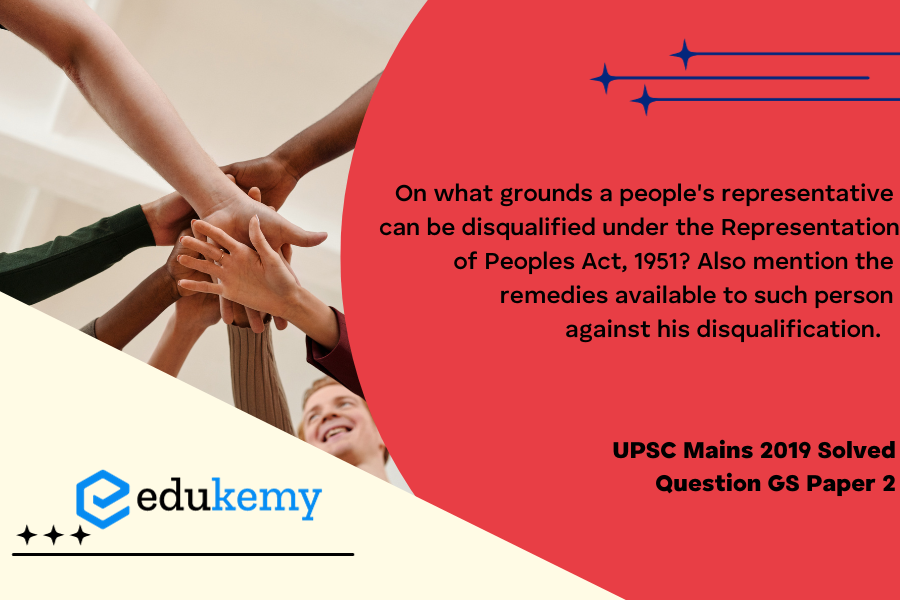The Representation of the Peoples Act, 1951, serves as the cornerstone of India’s electoral framework, outlining the qualifications and disqualifications of individuals seeking to become people’s representatives. Disqualification under this legislation can occur on various grounds, ensuring that those elected to public office maintain a certain standard of conduct and allegiance to democratic principles. One significant basis for disqualification is found in Section 8 of the Act, which stipulates that a person shall be disqualified for being chosen as, or for being, a member of either House of Parliament or the Legislative Assembly or Legislative Council of a state if they have been convicted of certain offenses, including corruption, disloyalty to the state, or promoting enmity between different groups.
Tag: Salient features of the Representation of People’s Act.
Contents
Decoding the Question:
- In the Introduction, try to briefly write about RPA.
- In Body,
- Discuss various grounds for disqualification under the Representation of Peoples Act, 1951.
- Mention the remedies available to such a person against his disqualification.
- In Conclusion, try to mention the importance of the election and the RPA 1951 Act.
Answer:
The Representation of The People Act, 1951 is an act to provide for the conduct of elections of the Houses of Parliament and to the House or Houses of the Legislature of each State, the qualifications and disqualifications for membership of those Houses. Sections 7 to 11 of the Act deal with the disqualification of representatives.
Grounds for Disqualification:
Under Section 8, the disqualification on conviction for certain election offenses and corrupt practices in the election:
- offense of bribery, promoting social crimes such as dowry, sati, etc.
- Protection of Civil Rights Act, 1955, which provides for punishment for the preaching and practice of “untouchability”.
- The offense of insulting the Indian National Flag or the Constitution of India and preventing the singing of the National Anthem.
The disqualification on conviction for certain offenses.
- A person convicted of an offense punishable under the offense of promoting enmity between different groups on the ground of religion, race, place of birth, residence, language, etc
- offenses relating to rape, cruelty towards a woman by a husband or relative of a husband.
- The person convicted of any offense and sentenced to imprisonment for not less than two years
Under Sections 9 and 9A, disqualification for Government contracts, dismissal for corruption or disloyalty, etc.
- A person shall be disqualified if and for so long as, there is a contract entered into by him in the course of his trade or business with the appropriate government for the supply of goods to or for the execution of any works undertaken by that government.
Under Section 10 of the Act, disqualification for office under a Government company.
- A person shall be disqualified if, and for so long as, he is a managing agent, manager, or secretary of any company or corporation (other than a cooperative society) in the capital of which the appropriate government has not less than twenty-five percent share.
Under Section 10 A, disqualification for failure to lodge an account of election expenses.
- The offense of undue influence or personation at an election and failure to lodge an account of election expenses.

The Act of 1951 also provides for the following remedies against disqualification:
- An election can be called in question only by an election petition. Election petitions are to be heard in the High Court with its appeal lying at the Supreme Court. They act as a mechanism of grievance redressal for the affected parties.
- Furthermore, on the question of whether a legislator is subject to any of the disqualifications the final authority to decide rests with the President (in case of members of Parliament) and the Governor (in case of members of State legislature).
- However, the President or Governor shall act according to the advice of the Election Commission of India.
- In case of any inquiry, the Election Commission is conferred the powers of a civil court for summoning and enforcing the attendance of any person or any evidence.
- Besides, after a legislator is disqualified, the Election Commission may, on certain grounds, remove any disqualification or reduce the period of any disqualification.
Elections form the bedrock of the largest democracy in the world. The robustness of electoral processes determines the future of the nation. The RPA 1951 has given a clear view on the disqualification of members of both houses of Parliament and State Assembly and their remedies.
In case you still have your doubts, contact us on 9811333901.
For UPSC Prelims Resources, Click here
For Daily Updates and Study Material:
Join our Telegram Channel – Edukemy for IAS
- 1. Learn through Videos – here
- 2. Be Exam Ready by Practicing Daily MCQs – here
- 3. Daily Newsletter – Get all your Current Affairs Covered – here
- 4. Mains Answer Writing Practice – here


